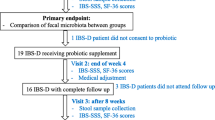Abstract
The purpose of this study was to determine the incidence of postinfectious irritable bowel syndrome (IBS) among community subjects with positive stool studies. This was a prospective cohort study whereby all individuals with stool-positive acute enteric infection (AEI) were recruited from 3 health regions in Ontario, Canada. Each person completed questionnaires regarding preinfectious bowel habit and their bowel habit 3 months postinfection. Manning and Rome I criteria were used to diagnose irritable bowel syndrome. Two hundred thirty-one patients participated. Forty had preexisting IBS and were excluded. Of the remaining 191 patients, 7 developed irritable bowel syndrome, for an incidence of 3.7% (95% confidence interval: 1.0–6.3%). Fever during AEI was the only identifiable risk factor for developing postinfectious IBS (odds ratio, 11.96; P = .02). The incidence of postinfectious IBS in community subjects is 3.7%. Fever during the AEI may be an important risk factor for this condition.
Similar content being viewed by others
References
Drossman DA, Whitehead WE, Camilleri M: Irritable bowel syndrome: a technical review for practice guideline development. Gastroenterology 112:2120–2130, 1997
Chaudhary NA, Truelove SC: The irritable colon syndrome. Q J Med 123:307–322, 1962
Sukhdeo MVK, Croll NA: Gut propulsion in ice infected with Trichinella spiralis. J Parasitol 67:906–910, 1981
Sethi AK, Sarna SK: Colonic motility in acute colitis in conscious dogs. Gastroenterology 100:954–963, 1991
Marzio L, Blennerhassett P, Chiverton S, Vermillion DL, Langer J, Collins SM: Altered smooth muscle function in worm-free gut regions of Trichinella-infected rats. Am J Physiol 259:G306–313, 1990
Barbara G, Vallance BA, Collins SM: Persistent intestinal neuromuscular dysfunction after acute nematode infection in mice. Gastroenterology 113:1224–1232, 1997
McKendrick MW, Read NW: Irritable bowel syndrome-post salmonella infection. J Infection 29:1–3, 1994
Neal KR, Hebden J, Spiller R: Prevalence of gastrointestinal symptoms six months after bacterial gastroenteritis and risk factors for development of the irritable bowel syndrome: postal survey of patients. BMJ 314:779–382, 1997
Maxwell P, Mendall M: Patients with the irritable bowel syndrome may underreport historical symptoms. BMJ 314:1902, 1997
Gwee KA, Graham JC, McKendrick MW, et al.: Psychometric scores and persistence of irritable bowel after infectious diarrhea. Lancet 347:150–153, 1996
Garcia Rodriguez LA, Ruigomez A: Increased risk of irritable bowel syndrome after bacterial gastroenteritis: cohort study. BMJ 318:565–566, 1999
Dunlop SP, Jenkins D, Neal KR, Spiller RC: Relative importance of enterochromaffin cell hyperplasia, anxiety, and depression in postinfectious IBS. Gastroenterology 125:1651–1659, 2003
Talley NJ, Phillips SF, Wiltgen CM, Zinsmeister AR, Melton LJ 3rd: Assessment of functional gastrointestinal disease: the bowel disease questionnaire. Mayo Clin Proc 65:1456–1479, 1990
Talley NJ, Phillips SF, Melton J 3rd, Wiltgen C, Zinsmeister AR: A patient questionnaire to identify bowel disease. Ann Intern Med 111:671–674, 1989
Drossman DA: A questionnaire for functional bowel disorders. Ann Intern Med 111:627–629, 1989.
Zigmond AS, Snaith RP: The hospital anxiety and depression scale. Acta Psychiatr Scand 67:361–370, 1983
Spinhoven PH, Ormel J, Sloekers PPA, Kempen GIJM, Speckens AEM, Van Hemert AM: A validation study of the hospital anxiety and depression scale (HADS) in different groups of Dutch subjects. Psychol Med 27:363–370, 1997
Aylard PR, Gooding JH, McKenna PJ, Snaith RP: A validation study of three anxiety and depression self-assessment scales. J Psychosom Res 31:261–268, 1987
Manning AP, Thompson WG, Heaton KW, Morris AF: Towards positive diagnosis of the irritable bowel. BMJ 2:653–654, 1978
Drossman DA, Thompson WG, Talley NJ, Funch-Jensen P, Janssens J, Whitehead WE: Identification of sub-groups of functional gastrointestinal disorders. Gastroenterol Int 3:159–172, 1990
Mayer EA, Collins SM: Evolving pathophysiologic models of functional gastrointestinal disorders. Gastroenterology 122:2032–2048, 2002
Wang LH, Fang XC, Pan GZ: Bacillary dysentery as a causative factor of irritable bowel syndrome and its pathogenesis. Gut 53:1096–1101, 2004
Ilnyckyj A, Balachandra B, Elliott L, Choudhri SH, Duerksen DR: Post-traveler’s diarrhea irritable bowel syndrome: a prospective study. Am J Gastroenterol 98:596–599, 2003
Lefebvre S, Ouellet V, Gaudreau C, Lamothe F, Boivin M: Clostridium difficile colitis at risk to develop irritable bowel syndrome. Can J Gastroenterol 13(Suppl B):90B, 1999
Ford DC, Borgaonkar MR, Marshall JK, et al.: The incidence of IBS following Clostridium difficile infection. Can J Gastroenterol 16(Suppl A):104A, 2002
Parry SD, Stansfield R, Jelley D, Phillips E, Barton JR, Welfare MR: Is irritable bowel syndrome (IBS) more common in patients presenting with bacterial gastro-enteritis?A community-based case-control study. Am J Gastroenterol 98:327–331, 2003
Thornley JP, Jenkins D, Neal K, Wright T, Brough J, Spiller RC: Relationship of Campylobacter toxigenicity in vitro to the development of postinfectious irritable bowel syndrome. J Infect Dis 184:606–609, 2001
James C, Thabane M, Borgaonkar MR, Marshall JK: Post-infectious irritable bowel syndrome (PI-IBS) is transient following a foodborne outbreak of acute gastroenteritis attributed to a viral pathogen. Gastroenterology 126(4, Suppl 2):A53, 2004
Talley NJ, Weaver AL, Zinsmeister AR, Melton III LJ: Onset and disappearance of gastrointestinal symptoms and functional gastrointestinal disorders. Am J Epidemiol 136:165–177, 1992
Fass R, Longstreth GF, Pimentel M, et al.: Evidence- and consensus-based practice guidelines for the diagnosis of irritable bowel syndrome. Arch Intern Med 161:2081–2088, 2001
Gwee K-A, Leong Y-L, Graham C, et al.: The role of psychological and biological factors in postinfective gut dysfunction. Gut 44:400–406, 1999
Author information
Authors and Affiliations
Corresponding author
Rights and permissions
About this article
Cite this article
Borgaonkar, M.R., Ford, D.C., Marshall, J.K. et al. The Incidence of Irritable Bowel Syndrome Among Community Subjects With Previous Acute Enteric Infection. Dig Dis Sci 51, 1026–1032 (2006). https://doi.org/10.1007/s10620-006-9348-1
Received:
Accepted:
Published:
Issue Date:
DOI: https://doi.org/10.1007/s10620-006-9348-1




